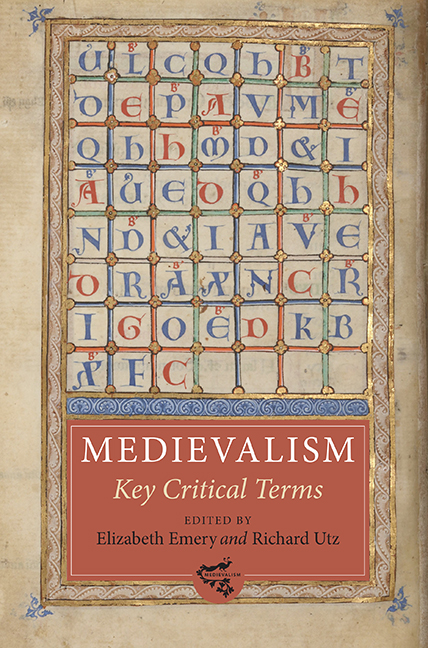Book contents
- Frontmatter
- Dedication
- Contents
- List of Illustrations
- List of Contributors
- Making Medievalism: A Critical Overview
- 1 Archive
- 2 Authenticity
- 3 Authority
- 4 Christianity
- 5 Co-disciplinarity
- 6 Continuity
- 7 Feast
- 8 Genealogy
- 9 Gesture
- 10 Gothic
- 11 Heresy
- 12 Humor
- 13 Lingua
- 14 Love
- 15 Memory
- 16 Middle
- 17 Modernity
- 18 Monument
- 19 Myth
- 20 Play
- 21 Presentism
- 22 Primitive
- 23 Purity
- 24 Reenactment
- 25 Resonance
- 26 Simulacrum
- 27 Spectacle
- 28 Transfer
- 29 Trauma
- 30 Troubadour
- Index
- Medievalism
27 - Spectacle
Published online by Cambridge University Press: 08 October 2022
- Frontmatter
- Dedication
- Contents
- List of Illustrations
- List of Contributors
- Making Medievalism: A Critical Overview
- 1 Archive
- 2 Authenticity
- 3 Authority
- 4 Christianity
- 5 Co-disciplinarity
- 6 Continuity
- 7 Feast
- 8 Genealogy
- 9 Gesture
- 10 Gothic
- 11 Heresy
- 12 Humor
- 13 Lingua
- 14 Love
- 15 Memory
- 16 Middle
- 17 Modernity
- 18 Monument
- 19 Myth
- 20 Play
- 21 Presentism
- 22 Primitive
- 23 Purity
- 24 Reenactment
- 25 Resonance
- 26 Simulacrum
- 27 Spectacle
- 28 Transfer
- 29 Trauma
- 30 Troubadour
- Index
- Medievalism
Summary
SPECTACLE: “A SPECIALLY prepared or arranged display of a more or less public nature (esp. one on a large scale), forming an impressive or interesting show or entertainment for those viewing it,” reads the Oxford English Dictionary (OED). The first offered example, from Richard Rolle's 1340 Psalter, describes “Hoppynge & daunceynge of tumblers and herlotis, and oþer spectakils.” Although the context here is specifically English, this medieval notion of spectacle as a kind of exotic performance carries into the present; much medievalism, intentional or accidental, takes the form of a spectacle, a creation to be both observed and experienced, although it exists alongside other, less exotic visions of spectacle. Spectacle's etymology in the Latin specere, “to look at,” suggests that all observed phenomena can be spectacles.
This might suggest an Anglo–American tradition distinct from other models whose view of spectacle is more general and less, perhaps, spectacular, and to some extent, many ideas of spectacle, most of which inform contemporary medievalism, do hearken to that tradition. Yet these more general understandings, such as Guy Debord's notable analysis which shows spectacle to be a condition of life rather than an excessive evocation of it, also offer valuable insight into the ways that medievalism functions as spectacle. It is important to see the ways that these two ideas intersect. Spectacle shares many features with “real” life, particularly in its intersection of the past and its building of communities; however, critics are not mistaken in suggesting that to be a spectacle, the phenomenon must offer more than an opportunity for mere looking. John MacAloon, for instance, observes:
Not all sights, however, are spectacles, only those of a certain size and grandeur, or as the dictionary puts it, “public displays appealing or intending to appeal to the eye by their mass, proportions, color, or other dramatic qualities.” For example, only films employing a “cast of thousands,” impressive scenery, and epic historical or religious themes are designated as spectacles.
- Type
- Chapter
- Information
- Medievalism: Key Critical Terms , pp. 231 - 238Publisher: Boydell & BrewerPrint publication year: 2014

